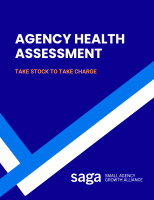Most agency owners prefer to spend time meeting the needs of their clients – and finding new ones. But staying on top of the general management of the business, including legal and accounting matters, plays an important role in the overall success of the firm.
In addition, basic financial planning and reporting can help to keep things on track and provide you with the tools and information that you need to generate better results.
The AIM-GET Framework that I have created as part of the Build to Own mindset to help guide agencies includes a focus on management issues like these to ensure that they don’t get overlooked.
To understand how well you are currently addressing these important items, ask yourself these five questions.
After paying you (and any partners) a fair amount of compensation for your work, does your agency consistently generate at least a 10% profit margin?
A common mistake is for agency owners not to pay themselves an actual salary or one that isn’t at market rates. Often this is done for legitimate tax purposes, but it is important for you to look at your agency-wide profit margin based on a fair amount of compensation for yourself for the work that you do on behalf of the business. (For more on this subject, I have written in detail about the difference between owner compensation and profits.)
Once you normalize your results by adding in your fair amount of compensation to the expense side of your ledger, you want to see a double-digit profit margin – and ideally something closer to 20%.
Remember that profits are the main financial metric you should be focusing on rather than revenue which is largely a vanity metric that can be used to impress others at cocktail parties.
If you are not satisfied with your own compensation or your agency’s profitability: determine the root cause of the problem to improve your margins while also assessing what represents fair compensation for your day-to-day work on behalf of your agency. A sagging profit margin or lackluster owner compensation often indicates issues with pricing or staffing that should be addressed so that they don’t hold back growth.
Have you worked with a lawyer to draft or review important documents, including client contracts, company formation documents, partnership agreements, and similar matters?
Not many agency owners would tell you that they enjoy spending time talking with their lawyers about necessary paperwork, but there’s no way to avoid it and run a business properly.
Well-structured legal documents can help to solve or even avoid problems. Clear client contracts don’t just set you up for success, but they also signal a level of professionalism to the client and their advisers.
For agencies with more than one owner, legal agreements to manage the partner relationships are especially important and must not be overlooked.
Your lawyer should be familiar with professional services businesses so that they offer you the most practical and appropriate advice.
Once you have a solid legal framework in place, you can generally get by with only periodic check-ins with your legal adviser when circumstances change or when clients want substantial edits to your standard agreements.
If you are not satisfied with the state of your agency’s legal affairs: begin to build a relationship with a lawyer who understands your business and will increase their knowledge and understanding of you and your firm over time. Check in at least once or twice annually even if you don’t have a specific request so the relationship is strong when you need to use it.
Do you consult with an accounting professional familiar with small businesses on a regular basis?
Many agency owners may have someone who they have consistently used to do their personal taxes. That individual may or may not be a good fit for serving the business, depending on what business accounting experience that they may have.
There is no need to overcomplicate your agency’s accounting structure, but you do want to make sure that you are complying with all relevant laws and regulations, as well as maximizing the benefits of being a business owner while minimizing your tax burden.
Having an ongoing relationship with your accounting professionals will help you to avoid surprises and keep as much of your hard-earned profits as possible. It also enables you to adjust to changing circumstances for your business, your personal financial situation, or the overall macroeconomic and tax environment.
If you are not satisfied with your agency’s accounting: identify your immediate needs for both tax and reporting purposes by working with an accountant who understands your situation. It is virtually impossible to run a successful agency for the long-term without accurate financial reporting and tax management.
Are you confident about the accuracy and completeness of your agency’s financial reports, including the Profit & Loss statement and Balance Sheet?
Proper bookkeeping helps you to better manage your business by giving you the information that you need to make important decisions. It can also help you to more accurately forecast expenses so you never find yourself in a bind, wondering how you are going to make payroll.
Good bookkeeping doesn’t need to be expensive, but it should be done by someone who understands your kind of business and can provide you timely and accurate reports.
You should be getting an accurate snapshot of your business finances every month so that you can take corrective action quickly if you notice expenses rising, revenue falling, or cash flow challenges developing.
In addition, you need to institute periodic checks – either by yourself or an independent accountant – to guard against inadvertent or even intentional discrepancies in your business finances.
If you are not satisfied with the state of your agency’s bookkeeping: work with your accountant to put in place an individual or service that you are both comfortable with who can reliably and consistently provide you with the information you need while relieving you of as much administrative burden as possible.
Does the agency have cash reserves equal to at least 3 months of operating expenses?
A huge source of stress for many agency owners is the fear of losing a major client or the inability to grow the team out of fear of not being able to meet payroll expenses.
If you are able to have at least 3 months of your basic operating expenses in the bank, it provides you with the runway to make more thoughtful decisions when you lose a client, need to hire a new team member, or need to fill the gap left by a departing employee.
It is important for this reserve to be in cash in the business bank account – not a line of credit or money in your personal account that you would need to loan into the business. The latter options may get you through a crisis but they aren’t sustainable options over the long-term.
If you are not satisfied with your cash cushion: identify the steps that you need to take in order to grow your reserves, while at the same time having a plan for how you would address any unexpected financial surprises in the meantime.
Conclusion
While most of us would prefer to focus on the creative aspects of our business or on bringing in new revenue, it is just as important to stay on top of the basic management requirements of any small business.
If you get your house in order using the Management portion of the AIM-GET Framework, it will provide you with the sound foundation and confidence to tackle the operational aspects of your business, including Growth, Execution, and Talent.
SAGA’s Agency Health Assessment can help you to look at some of the key drivers of success to identify other areas you may wish to focus on for improvement.










